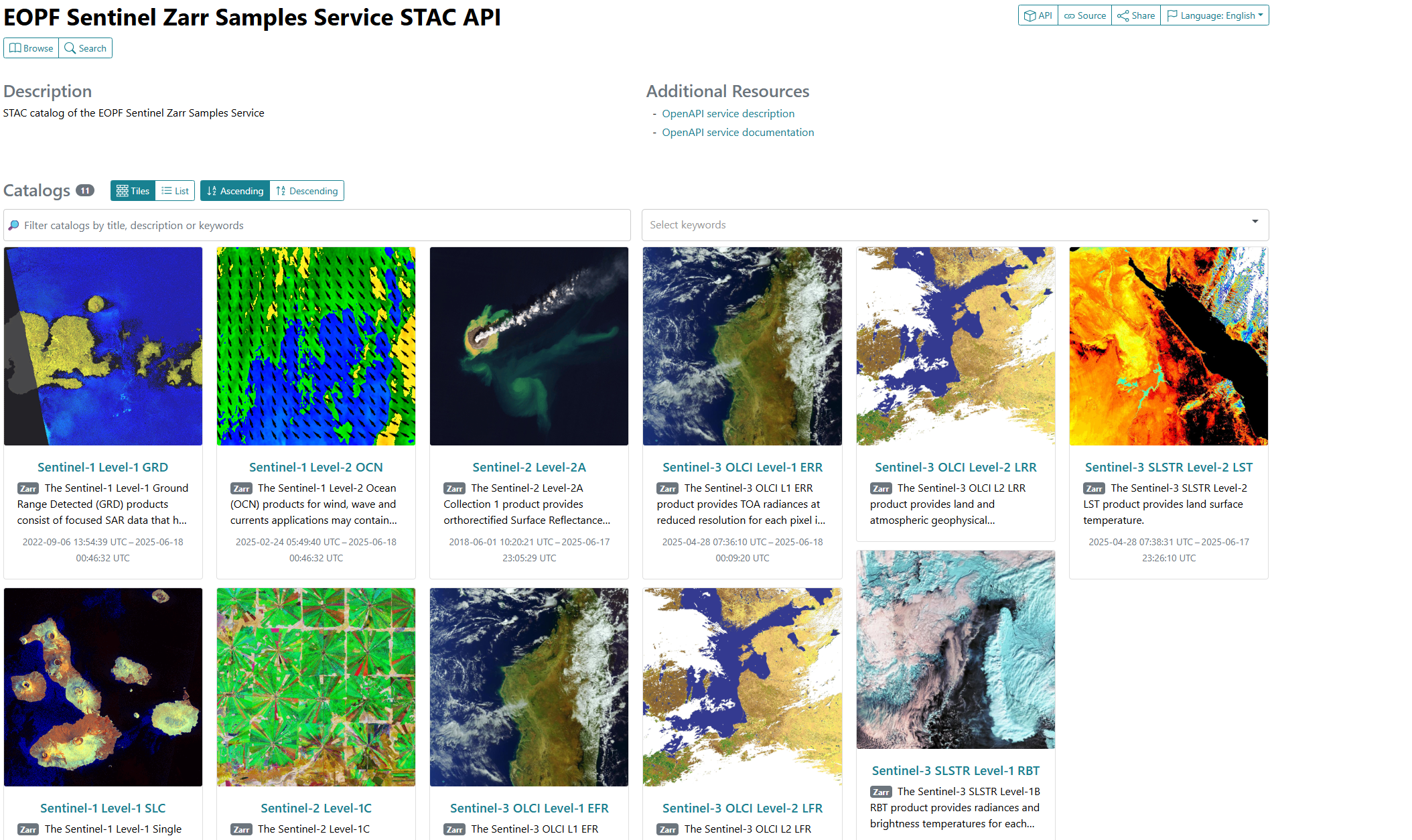Get ready to hack together!¶
Date: September 30, 2025 | Time: 09:00 am - 5:00 pm | Location: Room 401, BiDS25, Riga, Latvia
🎯 Hackathon Objectives¶
Transform how we access and process Copernicus Sentinel data using cloud-native technologies! This hackathon event focuses on:
Exploring the EOPF Sentinel Zarr Samples Service and its diverse datasets;
Developing new Jupyter notebooks that leverage the existing EOPF Sample datasets;
Experimenting with Discrete Global Grid Systems (DGGS), particularly HEALPix, starting from EOPF Sample datasets;
Familiarize Yourself:¶
New to EOPF? No problem! Make sure to attend the EOPF Sample Service - Getting Started with Zarr (Sep 29, 01:30 PM - 05:00 PM, Room 103).
Start with EOPF 101: https://
eopf -toolkit .github .io /eopf -101/ - Essential introduction to the EOPF ecosystem Browse available datasets in the STAC catalog (11 different Sentinel collections!)
Review example notebooks: EOPF Sample Notebooks
Check out the GitHub repository: https://
github .com /EOPF -Sample -Service /eopf -sample -notebooks
🚀 Pre-Hackathon Setup (Complete Before 09:00)¶
Essential Registration Steps:¶
Register for Copernicus Data Space Ecosystem: https://
dataspace .copernicus .eu Access JupyterHub Environment: https://
jupyterhub .user .eopf .eodc .eu /hub Explore the STAC Browser: https://
stac .browser .user .eopf .eodc .eu

📅 Detailed Agenda¶
🌅 Morning Session (09:00 - 12:30)¶
09:00 - 09:30: Welcome & Team Formation¶
Welcome & Introductions (15 min)
Quick Overview: EOPF ecosystem and Zarr Samples Service capabilities
New to EOPF? Quick reference to EOPF 101 for foundational concepts
Team Formation: Based on interests and proposed projects (see Project Ideas below)
09:30 - 10:30: Data Exploration Sprint¶
Hands-on exploration of the STAC browser
Discover available datasets:
Sentinel-1 (GRD, SLC, OCN)
Sentinel-2 (Level-1C, Level-2A)
Sentinel-3 OLCI & SLSTR products
Identify data for your project ideas and agree on the use case you would like to work on.
10:30 - 10:45: ☕ Coffee Break¶
10:45 - 12:30: Project Kickoff¶
Finalize team projects and register them as GitHub issues
Download the official notebook template: template.ipynb
Review contribution guidelines (see Contribution Guidelines below)
Begin coding: Start with existing examples and adapt to your use case
Technical support available from EOPF team
🍽️ 12:30 - 13:30: Lunch Break¶
🌞 Afternoon Session (13:30 - 17:00)¶
13:30 - 15:30: Deep Development¶
Intensive coding session
Experiment with:
Multi-source data fusion
DGGS/HEALPix implementations
Advanced chunking strategies
Zarr optimization techniques
Collaborative problem-solving
15:30 - 15:45: ☕ Coffee Break¶
15:45 - 16:30: Project Presentations¶
5-minute team presentations of developed notebooks
Demo your solutions and key findings
Community feedback and discussion
16:30 - 17:00: Wrap-up & Next Steps¶
Reflection on achievements
Discussion of future development
Community notebook competition introduction
Closing remarks
18:00 - 18:30: Celebration & Awards¶
💡 Project Ideas & Team Formation¶
How to Participate:¶
Browse Existing Challenges: Check our GitHub Issues for predefined problems
Propose New Ideas: Create a new issue describing your project concept
Join a Team: Comment on issues you’re interested in contributing to
🎯 Suggested Project Themes:¶
Multi-Mission Data Fusion¶
Combine Sentinel-1 SAR with Sentinel-2 optical data for enhanced land cover mapping
Integrate Sentinel-3 ocean products with meteorological data
DGGS Applications¶
Implement HEALPix gridding for global climate monitoring
Develop DGGS-based data aggregation workflows
Performance Optimization¶
Optimize chunking strategies for different use cases
Benchmark Zarr vs. traditional formats
Novel Applications¶
Time-series analysis across multiple Sentinel missions
Machine learning pipelines using cloud-native data
Interactive visualization dashboards
Metadata & Standards¶
Explore Parquet for metadata storage
Contribute to GeoZarr and CF-conventions discussions
🤝 Team Formation Process:¶
Before the hackathon:
Create or comment on GitHub issues with your interests
Use issue labels:
hackathon-2025,team-wanted,dggs,multi-mission, etc.
During the hackathon:
Teams of 2-4 people work best
Mix of skills encouraged (data scientists, developers, domain experts)
One designated team lead for coordination
🛠️ Technical Resources¶
Available Tools & Libraries:¶
Data Access / Processing: STAC, xarray, Dask, EOPF toolkit (e.g. xarray-eopf, xcube-eopf, EOPF Julia Reader)
Visualization: Matplotlib, Plotly, Folium
Languages: Python, Julia
Grid Systems: HEALPix, DGGS implementations
Templates: Official Jupyter notebook template (required for all submissions)
Getting Help:¶
EOPF team members available throughout the day
New to EOPF? Start with EOPF 101 for core concepts
Slack channel: #eopf-hackathon (link provided on-site)
Documentation: EOPF Sample Notebooks
Data Available:¶
Real Copernicus Sentinel data in Zarr format
Global coverage with recent acquisitions
All processing levels from L1 to L2
Optimized chunking for cloud processing
📋 Project Registration¶
Create Your Project Issue:¶
Use this template when creating a new GitHub issue:
**Project Title**: [Your innovative project name]
**Team Members**: [@github-username1, @github-username2, ...]
**Objective**: [Brief description of what you want to achieve]
**Data Sources**: [Which Sentinel missions/products you'll use]
**Technical Approach**: [Tools, methods, or algorithms you plan to explore]
**Expected Outcome**: [Jupyter notebook, visualization, analysis results, etc.]
**Skills Needed**: [What expertise would be helpful for your team]
**Labels**: hackathon-2025, [add relevant tags: dggs, multi-mission, performance, etc.]Join Existing Projects:¶
Comment on existing issues with:
Your background and skills
How you’d like to contribute
Your GitHub username for team coordination
🏆 What Success Looks Like¶
By the end of the day, each team should have:
A working Jupyter notebook following the provided template
Template compliance with all required metadata and documentation sections
Clear documentation of your approach and findings
Identified next steps for further development
Contributions to the EOPF community knowledge base
Bonus Achievements:¶
Novel use of DGGS/HEALPix for EO applications
Performance improvements or optimization insights
Cross-mission data fusion techniques
Reproducible workflows others can build upon
🔄 After the Hackathon¶
Stay Connected:¶
Join ongoing discussions and join the EOPF Community Support Platform on Discourse
Ready to hack? Let’s build the future of cloud-native Earth Observation together! 🌍🛰️
Questions? Contact the organizing team or join our Slack workspace for real-time support.